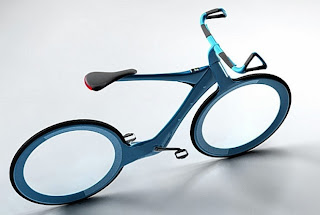Today's idea comes from my biology textbook. Like all science textbooks I've had, it begins with the basic baby-step kind of information that I've come to expect. After making it through the not-so-subtle jabs at the other branches of science (usually Psychology, the scrawny kid brother of the other sciences), and the ferocious, belligerent sentiments on Creationism, I reached the bit that actually involved some science. A few pages later and it hit me that there's quite a bit of science in the world. This seems obvious, but I found it to be a rather novel idea. I know there's a lot of science because it seems like no matter how many classes one takes on science, biology, anatomy, chemistry, psychology, and the literally jillions of other sub-sub-sub-branches of sciences both big small, real and make-believe, there is always more science to learn. It's like trying to touch every drop of water in the ocean.
 |
| "This is it! The final science!" |
We've never seen anything like this in movies or television (as far as I know). Even in those Star series (Wars, Trek, Gate and Battle), even the most advanced civilizations seem like they're working toward better technology. Nobody has reached the Third Tier of technology (I'm putting it in Starcraft terms) where there's nothing else to do except build armies and zerg the enemy's base.
 |
| Or those silly scientists could stop trying to create a Big Bang and start building us this amazing bike! |
Personally I don't believe it's possible for anyone to know everything there is to know about everything (except, you know, that one Guy). Frankly it would make for a boring existence. Scientists would hold cardboard signs in the street. Research institutes would have to turn into colleges ("gross," thought professor Xavier), and the large Hadron Collider would have to be sold for scrap parts or turned into a really amazing roller coaster.
The point is, the world as we know it wouldn't resemble this Science Complete world even a little. It would be a place of magic-like technology, endless energy supplies, super food and other inventions that heretofore are thought to be impossible.
 Like faster-than-light drives or a portal gun. Like from Portal. I know it's bad grammar. I just want my darn portal gun.
Like faster-than-light drives or a portal gun. Like from Portal. I know it's bad grammar. I just want my darn portal gun.Chances are that we humans would be mostly the same, though. To put it in modern terms, the internet is amazing; and we use it to send each other videos of cats farting. We'd probably use the portal gun to deliver food directly to our mouths. We'd be like those unitard-clad fatties from Wall-E.
Did I really just get all of this text from a wandering thought I had while reading about cellular reproduction? Maybe I should read my textbook more often.
Maybe we ALL should read our textbooks, fellow students. That's right, this blog was all a clever ruse to get kids to pay attention in school. Take THAT, Magic School Bus.
I think it was Heinlein who actually drew a timeline on his wall of when, in his science fiction, man would achieve certain goals like space travel, light speed, etc. etc., and if I remember correctly, at the end of the timeline, once man had achieved everything, he went back to being uber religious, a la the Covenant. I thought that was funny.
ReplyDeleteI like your idea. I wonder where it might lead?
Humans are programmed to keep learning and exploring. I'm not sure we will ever get to the point of "knowing" everything, because God is the only one who knows everything and well, we're not God. But if we were to max-out on science, so to speak, I think we would either die, or revert to neanderthal because the lack of learning and exploring would rot out our brains.
ReplyDeleteGood thoughts William, I am glad when you learn stuff because it helps my brain to see possibilities I might not have thought of or even imagined. I love your blog!
ReplyDelete